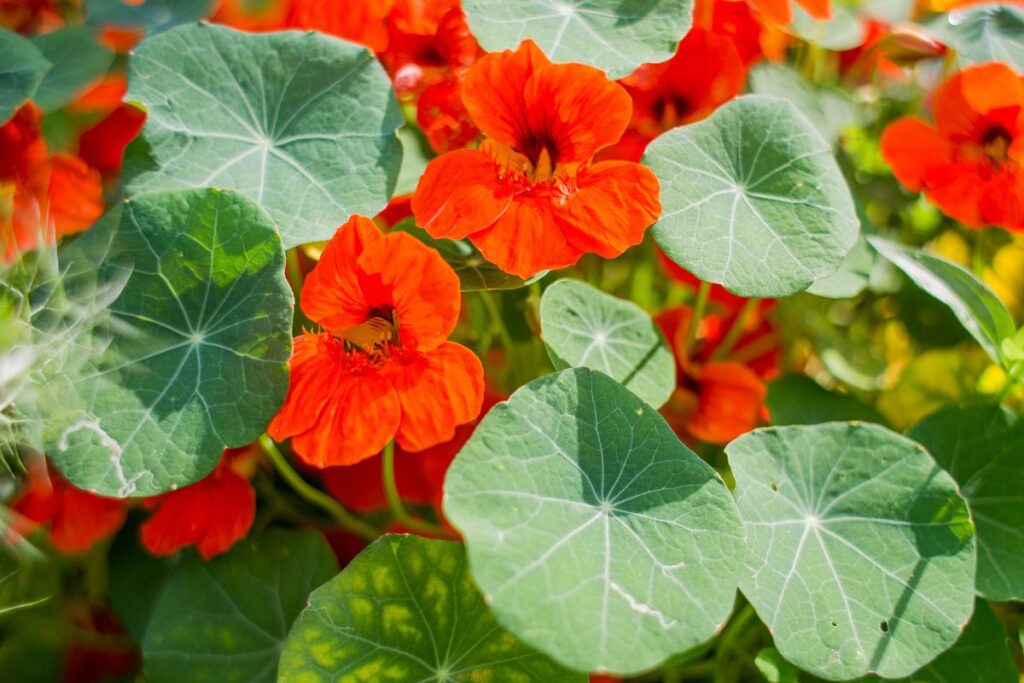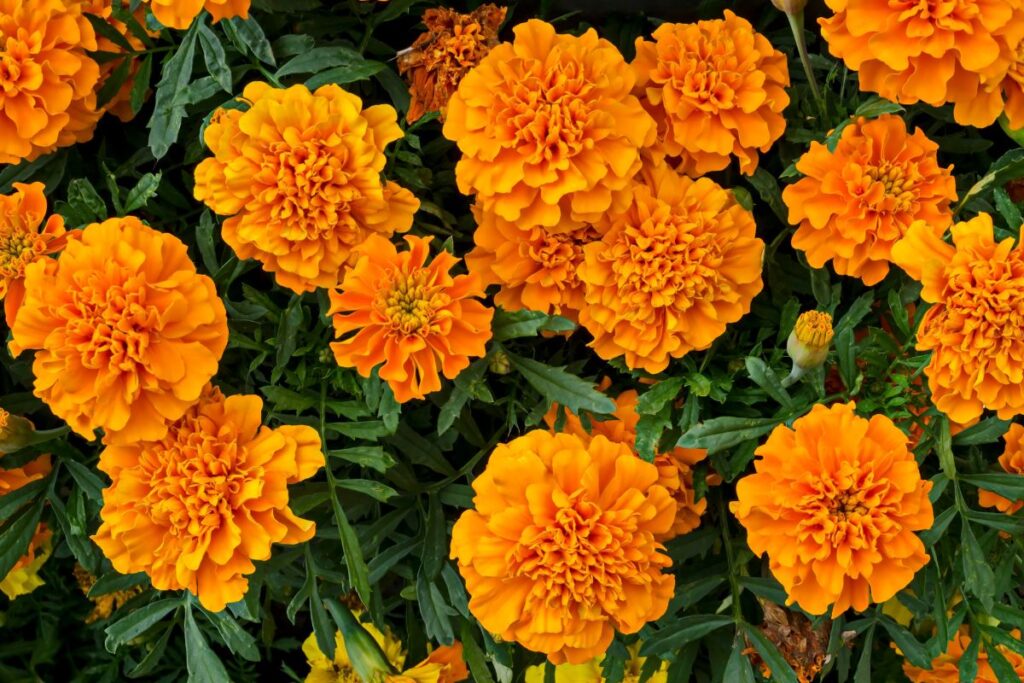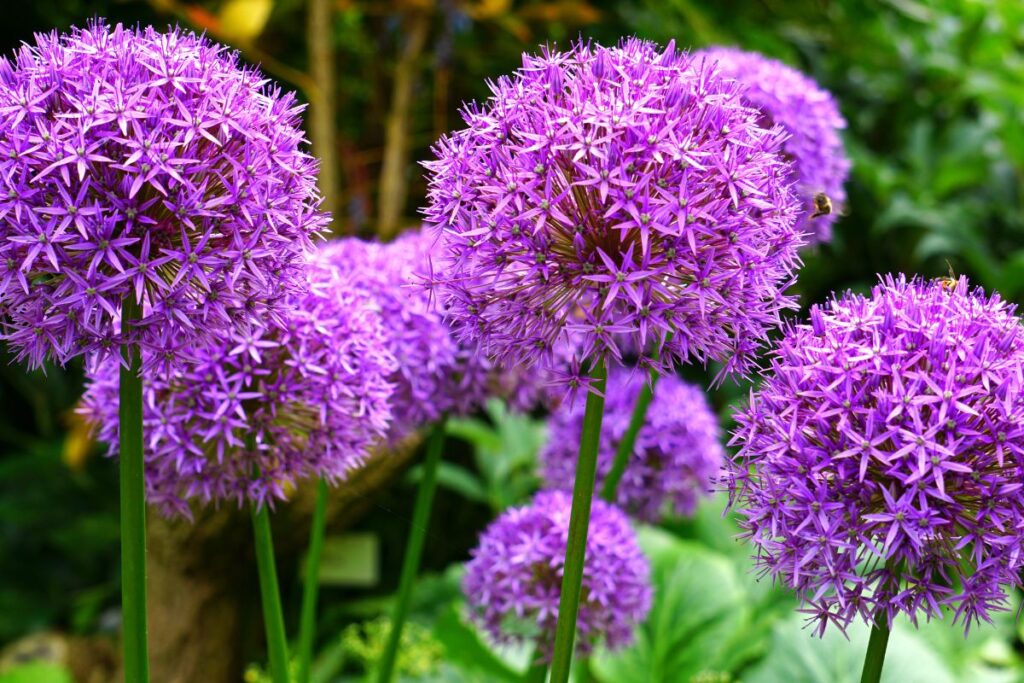Love growing geraniums?
Enhance their beauty and health with the right companion plants.
Explore the best plants to pair with your geraniums for a thriving garden.
Curious about the perfect companions?
Let’s dive in!
1. Nasturtium

Planting nasturtiums alongside geraniums enriches your garden aesthetics and overall health. These vibrant bloomers not only enhance the aroma but also share geraniums’ cultivation needs, ensuring they flourish together. Crucially, nasturtiums naturally repel pests that may damage geraniums.
For optimal growth, position them to bask in a minimum of 6 hours of sunlight daily; less exposure diminishes their flowering potential. Their preference lies in soil that allows proper drainage. Provide water when the surface layer begins to feel dry to touch.
2. Catnip

Cat enthusiasts treasure Nepeta cataria, commonly known as catnip, for its ability to captivate feline senses, whereas it’s known to repel insects such as aphids and beetles which are unfriendly to plants like geraniums. Deploying catnip in your garden acts as a natural deterrent to these undesirable visitors.
This herb is vigorous and may spread extensively if not managed properly. To curb its expansive nature, consider excising the blooms prior to seed formation. Alternatively, confine it within pots, or intersperse it with other plants as a containment strategy.
Catnip is undemanding and adaptable, flourishing in a variety of soils and lighting conditions from full sunlight to dappled shade. For a more condensed and lush foliage, regular trimming is advisable.
3. Chives

Growing chives in your garden does more than just provide a ready supply of the herb for your kitchen; these plants are exceptional companions for geraniums, as their distinct scent deters carrot flies. This aroma also serves to entice pollinators such as butterflies and honey bees, which improves the flowering and health of your garden plants.
The presence of chives also invites ladybugs, which actively feast on aphids, naturally reducing your plant’s exposure to these common pests. The potent smell of chives has the added advantage of repelling beetles and other insects that could be detrimental to your greens.
Cultivating chives is straightforward—they flourish in a variety of soil conditions as long as they receive sufficient sunlight and moisture. Whether beginning with seeds indoors or opting for ready-to-plant chives from your local nursery, you’ll find they are a hassle-free addition to your garden that brings ecological balance and ease of care.
4. Marigolds

Marigolds, akin to nasturtiums, enhance gardens by creating stunning displays. These flowers not only add visual appeal but serve a practical purpose.
Pest Deterrence: Marigolds are effective in warding off slugs known to damage geranium foliage. Additionally, they keep mosquitoes at bay, allowing you to enjoy your outdoor space without the nuisance of insect bites.
Growth Conditions:
- Sunlight: Thriving in full to partial sunshine.
- Soil Type: They are undemanding regarding soil quality, yet insist on efficient drainage.
- Propagation: You have the choice to cultivate marigolds through direct seeding or by planting them as nursery-grown containers.
By incorporating marigolds, you’ll not only beautify your garden but also create a natural, pest-controlled environment.
5. Alliums

Alliums emit a strong odor which pairs exceptionally well with the tangy scent of geraniums. While aphids may not be deterred by the robust scent of alliums, planting these alongside geraniums can help protect them, as the latter’s aromatic blooms repel these common pests. Additionally, alliums have a beneficial effect on keeping rabbits at a distance, ensuring they don’t damage your geraniums.
Regarding cultivation, alliums thrive in places that bask in full sunlight. Without adequate light, their growth may be stunted, leading to bending stems. For optimal growth, plant them in soil that drains properly. These resilient plants have a high drought tolerance, thus they only require watering occasionally. With the right conditions, your Alliums should flourish alongside their geranium companions.
Companions for Geraniums
Geraniums share spaces harmoniously with various plants. Consider these allies for your geraniums:
- Creeping Jenny (Lysimachia nummularia)
- Angelonia (Angelonia angustifolia)
- Asparagus fern (Asparagus setaceus)
- Spider plant (Chlorophytum comosum)
- Wave petunias (Petunia hybrida)
- Celery (Apium graveolens)
- Ivy (Hedera helix)
- Canna (Canna species)
- Sage (Salvia officinalis)
- Corn (Zea mays)
- Tomato (Solanum lycopersicum)
- Verbena (Verbena species)
- Blue daze (Evolvulus glomeratus)
- Basil (Ocimum basilicum)
- Chrysanthemum (Chrysanthemum species)
- Cabbage (Brassica oleracea)
- Coleus (Solenostemon scutellarioides)
- Celosia (Celosia species)
- Sweet potato vine (Ipomoea batatas)
Your geranium garden will flourish with these plant partners that bring out the best in each other.

